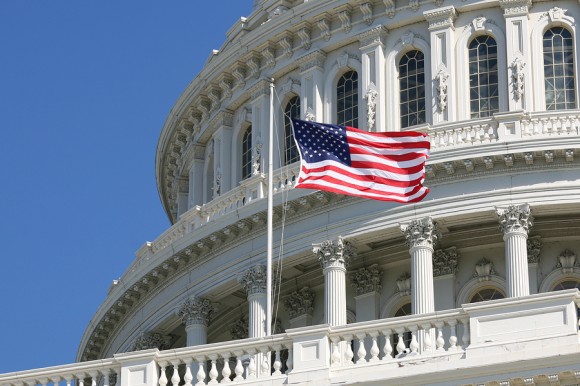Marsh McLennan lost 358 employees in the terrorist attack on the World Trade Center on Sept. 11, 2001, and in Washington today Michelle Sartain, who has worked at Marsh for more than 28 years, encouraged lawmakers to reauthorize the Terrorism Risk Insurance Act.
“By all accounts, the program has been a model public-private partnership, said Sartain, president Marsh U.S. and Canada. “The backstop remains a critical component to a stable terror insurance market, particularly for nuclear, biological, chemical, and radiological (NBCR) events, and has enabled insurance to be placed and investments to be made.”
The federal backstop for terrorism risk was first initiated late in 2002 to respond to insurers’ forced exclusion of terrorism risks from commercial property/casualty insurance policies following losses from the terrorist attacks. The change put construction projects on hold since financers required the insurance. Meanwhile, a crisis began in workers’ compensation due to the high levels of exposure faced in the line of business since state laws prohibited prohibited a terrorism exclusion.
The federal legislation requires insurers to offer terrorism coverage while the industry has the assurance that if losses from a certified terrorism event reach a certain thresholds (the event needs to exceed $5 million in losses and $200 million in industry losses), the government will step in. TRIA has been reauthorized several times, the latest at the end of 2019. It is due to expire again Dec. 31, 2027.
Sartain offered 17 pages of testimony covering TRIA’s history and features—and outlined how certain industries such as healthcare and higher education rely on TRIA. On Sept. 17 she told the U.S. House Financial Services Subcommittee on Housing and Insurance that the terrorism backstop allows for insurers and reinsurers quantify exposures and provide capacity into the market.
Although the expiration is two years away, “insurers and rating agencies closely monitor legislative activity related to [TRIA],” Sartain explained. “Any uncertainty regarding the future of the federal backstop as the deadline approaches will have an impact on the availability and nature of insurance coverage. That, in turn, could send ripple effects through the economy, and potentially affect companies’ decision-making processes about hiring and investing.”
If the backstop were to expire without a replacement, “insurers that are still able to offer terrorism coverage will likely only write coverage for buyers with operations in preferred locations, and could consider increasing prices for other locations,” Sartain wrote.
“This would lead to capacity shortfalls for central business districts, at-risk industries, and employers with significant workers’ compensation accumulations, such as office workers, manufacturing facilities, and healthcare and education facilities,” she continued.
Elizabeth Heck, former chair of the National Association of Mutual Insurance Companies (NAMIC), also testified before the subcommittee. She said TRIA provides certainty, and has allowed insurers to offer coverage.
“Thankfully, the program has yet to be tested and as we look back nearly 25 years after the attacks, it is important to recognize how much construction and economic development TRIA has supported, all at no cost to the taxpayers,” said Heck, adding that she was in lower Manhattan on Sept. 11 and evacuated with her family. They never returned home, she said.
Heck, president and CEO of Greater New York Insurance Company, said she has experience as a “major writer of terror exposed property in New York City.”
“While insuring against the financial devastation that could accompany a catastrophic terrorist attack might sound like a reasonable protective measure for markets to take on, a large-scale terrorist attack – like an act of war – is not insurable,” Heck submitted to the committee.
“Terrorism is rooted in malicious, strategic human behavior creating dynamic threats that often involve unknown national or international actors. It is purposefully unpredictable and continuously evolving, always with the intent of causing harm. This is one reason why it is extremely difficult, and potentially impossible, to fully predict or meaningfully measure and confidently model terrorism risk for purposes of underwriting and rating.”
About 79% of commercial multiperil policies in the U.S. include some level of terrorism coverage, and insurer appetite for the risk has increased. While NAMIC generally opposes federal backstop programs, Heck said TRIA “represents the rare situation where a clearly defined problem can only be solved by a federal partnership to facilitate insurability in a way that does not harm markets or market participants and ultimately reduces risk against scenarios where other solutions have been exhausted.”
NAMIC proposed a 10-year reauthorization with no significant changes to the program’s structure.
In a letter to the committee from the American Property Casualty Insurance Association (APCIA), the trade association pointed out that program was allowed to lapse for 12 days in 2014.
“This led to considerable confusion among insurers and policyholders about the status of in-force terrorism coverage,” APCIA said. “Many insurers had contingent exclusions included in their non-workers’ compensation insurance policies, which provided policyholders with terrorism insurance subject to the program’s reauthorization. When the program lapsed, some of those exclusions took effect and, had a major loss occurred, the consequences for the country could have been enormous.”
It did not testify at the hearing but the association called on Congress to reauthorize TRIA with no change to financial thresholds. In a statement, Sam Whitfield, senior vice president of federal government relations, added: “TRIA is a fiscally sound program that has operated for 23 years with minimal cost to taxpayers. Its continued existence is vital to maintaining confidence in the marketplace and ensuring the availability of terrorism coverage that businesses and communities rely on.”
Topics Catastrophe Natural Disasters Market
Was this article valuable?
Here are more articles you may enjoy.



 AI Claim Assistant Now Taking Auto Damage Claims Calls at Travelers
AI Claim Assistant Now Taking Auto Damage Claims Calls at Travelers  Jury Finds Johnson & Johnson Liable for Cancer in Latest Talc Trial
Jury Finds Johnson & Johnson Liable for Cancer in Latest Talc Trial  Fla. Commissioner Offers Major Changes to Citizens’ Commercial Clearinghouse Plan
Fla. Commissioner Offers Major Changes to Citizens’ Commercial Clearinghouse Plan  World’s Growing Civil Unrest Has an Insurance Sting
World’s Growing Civil Unrest Has an Insurance Sting 


